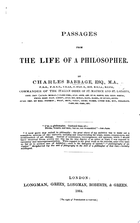
"Passages from the life of a philosopher", Appendix: Miracle. Note (A)
Passages from the Life of a Philosopher (1864)
Context: It has always occurred to my mind that many difficulties touching Miracles might be reconciled, if men would only take the trouble to agree upon the nature of the phenomenon which they call Miracle. That writers do not always mean the same thing when treating of miracles is perfectly clear; because what may appear a miracle to the unlearned is to the better instructed only an effect produced by some unknown law hitherto unobserved. So that the idea of miracle is in some respect dependent upon the opinion of man. Much of this confusion has arisen from the definition of Miracle given in Hume's celebrated Essay, namely, that it is the "violation of a law of nature." Now a miracle is not necessarily a violation of any law of nature, and it involves no physical absurdity. As Brown well observes, "the laws of nature surely are not violated when a new antecedent is followed by a new consequent; they are violated only when the antecedent, being exactly the same, a different consequent is the result;" so that a miracle has nothing in its nature inconsistent with our belief of the uniformity of nature. All that we see in a miracle is an effect which is new to our observation, and whose cause is concealed. The cause may be beyond the sphere of our observation, and would be thus beyond the familiar sphere of nature; but this does not make the event a violation of any law of nature. The limits of man's observation lie within very narrow boundaries, and it would be arrogance to suppose that the reach of man's power is to form the limits of the natural world. The universe offers daily proof of the existence of power of which we know nothing, but whose mighty agency nevertheless manifestly appears in the most familiar works of creation. And shall we deny the existence of this mighty energy simply because it manifests itself in delegated and feeble subordination to God's omnipotence?
